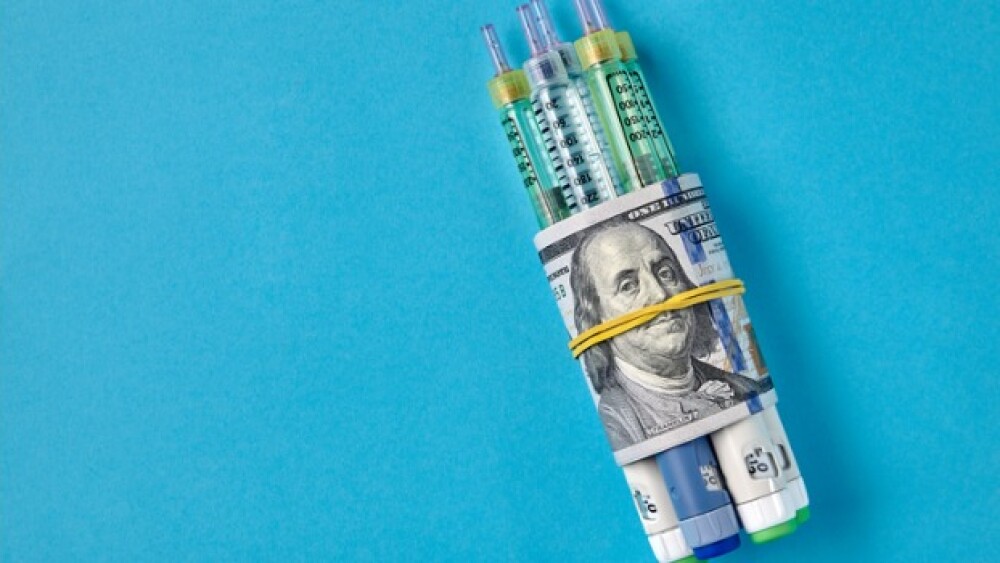As insulin prices skyrocket, pharmas and PBMs faced pointed critique from the Senate HELP Committee, led by Sen. Bernie Sanders (I-VT).
Pictured: Insulin syringes wrapped by 50 dollar bill /Courtesy iStock, Maksim Luzgin
The CEOs of Eli Lilly, Sanofi and Novo Nordisk and executives from three top pharmacy benefit managers sat before the Senate Committee on Health, Education, Labor and Pension (HELP) Wednesday, under the glare of chairman Sen. Bernie Sanders (I-VT) as part of his decade-long crusade for insulin price reform.
These companies represent 90% control of the global insulin market, according to the Department of Health and Human Services. With the passage of the Inflation Reduction Act (IRA), the companies were forced to cap insulin copays at $35 per month and cap insulin expenses for seniors at $2,000 a year via Medicare.
“We have to conclude that there is an enormous amount of greed going on,” Sanders said. “Let’s not be naive. The drug companies last year made $100 billion in profit. PBMs made $27 billion in profit. Drug companies tell us that that money goes to research and development. More money went into stock buybacks, significantly more than research and development.”
The Role of PBMs
The cost of insulin has increased 1000-fold for consumers since 1996, Sanders said during the proceedings. Sanders and many of his committee cohorts zeroed in on PBMs as the 800-pound gorilla.
PBMs from CVS Health, Express Scripts and OptumRx faced intense scrutiny from senators on both sides of the aisle over their role in skyrocketing insulin prices.
PBMs work with health insurance plans to manage prescription drug benefits. They act as intermediaries between drug manufacturers, pharmacies and insurers to negotiate drug prices, develop formularies and process claims.
Biosimilars are biologic drugs that are highly similar to and have no clinically meaningful differences from an existing FDA-approved reference biologic drug, which is often referred to as the original or brand-name product. As a result, they are often much cheaper and sought after as a way to lower patient costs.
“The difficulty that biosimilars have in getting on to the market and getting chosen by a PBM for a formulary; this makes no sense whatsoever to me—if you really care about lowering prices,” said Sen. Susan Collins (R-ME).
Senators critical of the PBM industry argued that the lack of transparency in PBM operations plays a large part in unaffordable insulin. PBMs and pharma repeatedly blamed each other for high drug prices under the committee’s questioning.
Pointing the Finger Elsewhere
For their part, pharma indicated they would commit to lowering insulin prices. David Ricks, CEO of Eli Lilly, emphasized the company’s plan to lower consumer costs and its commitment to ensure people don’t have to ration insulin “in deciding to pay for medication or groceries.”
“If you contact Lilly today, we will ship you a month’s supply, at no cost, with one question: ‘What’s your address?’” he said.
Ricks said people can enroll in an annual program to further discount insulin on Lilly’s website, provided their annual income is no more than $57,000 per year.
Paul Hudson, CEO at Sanofi, said his company has repeatedly tried to bring lower-cost alternatives to market, to no avail, blaming PMBs for holding up such a move and refusing to add alternatives to insurance formularies.
“Last year in August, we launched Lantus and an unbranded Lantus, made in the same factory by the same excellent people with this 60% discount to the list price. It was just not listed on the health plans [formularies],” he said.
PBM representatives, including CVS Health Executive Vice President David Joyner, pointed back at pharma to bear the responsibility for the price spike.
“We start with using competition to negotiate to the lowest net cost,” Joyner said. “That passes on to our employers, government entities and unions to manage the benefit. We encourage them, with the savings generated through the rebates and discounts, to actually offer a more affordable benefit either on a preventative drug list or encourage them to use the discounts at the point of sale.”
PBMs negotiate prices with pharmaceutical companies on behalf of insurers and employers, but their negotiations are often opaque and can result in higher consumer prices, said William Soliman, founder and CEO of the Accreditation Council for Medical Affairs,
Soliman told BioSpace PBM reform is needed and will likely require Congressional action to see results.
“The key issue is how PBMs are incentivized,” he said. “Set administrative fees as a percentage of the drug price and they collect a rebate from the drug.
A PBM monopoly that exists where three PBMs control 85% of the field is problematic, he said, referencing a recent report commissioned by Rep. James Comer (R-KY) via the House Oversight Committee.
Sanders summed up the complexity of the problem and urgency for reform.
“Why can’t we make that product available to all at a price that they can afford? That is a moral issue. So we’ve got a lot of work to do. But we clearly need revolutionary changes in the way we do prescription drugs in this country.”
Lisa Munger is a senior editor at BioSpace. You can reach her at lisa.munger@biospace.com. Follow her on LinkedIn.





